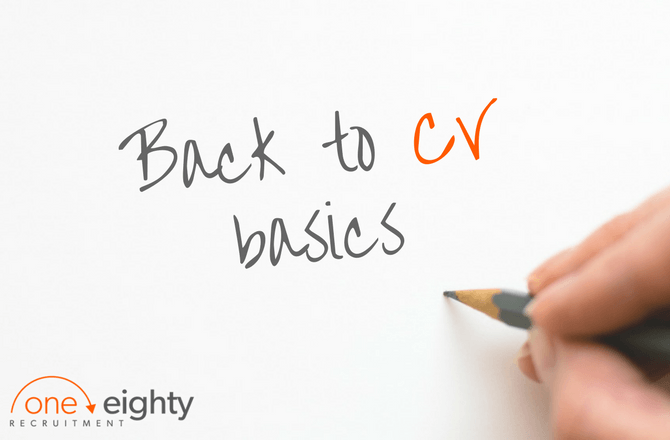Back to CV Basics
Default Author • March 29, 2017

Back to CV Basics
When it comes to CV’s there is lots of advice. Most job boards will tell you the basics; include this, don’t include that and always write a cover letter. If that’s the information you’re looking for then check our resource
section.
But as I process all one eighty’s CV’s, I thought I’d give you my thoughts on the good, bad and the ugly of CVs.
First things first, a CV is not the place to write your whole life story. It’s a professional document that is meant to show your skills, qualification’s and experience, not act as a draft for your impending biography. Employers want a few short paragraphs about you, your skills and then your experience; which ideally should be in list format, ordered chronologically from your most recent to your least recent. Then include any other information they ask for e.g. details of projects you’ve worked on or a portfolio if required.
For your sake, please write a profile. A profile is a short paragraph that gives employers a bit of a background about you and why you are looking for a new job. I’m not saying write ‘I can’t stand my manager anymore!’ while that may be true, that’s a bad idea! However, if you want a role where there’s room to grow or a new challenge, state so. This will help with matching you to a role and organisation that fits your wants and needs.
When writing about your previous work experience the term ‘short and sweet’ applies. A few clear and concise sentences explaining your main responsibilities in the role is perfect! I recommend that when writing this part you try to not assume they know what your roles included. You could end up skipping over important skills or experience that will help you stand out from other applicants. If you were a Project Manager who communicated with clients and contractors while managing a project, say so.
However, please don’t ‘copy and paste’ your previous job descriptions. It is highly unlikely that all the tasks you perform in your job are actually in your job description. Using only your job description looks like corner cutting, indicating to employers you couldn’t be bothered. Which is not the impression you want to give, is it? It's also a good idea to try and talk about your interests and achievements outside of work too. You're a human being, show them that!
Lastly, be prepared to constantly tailor your CV. It is best to adapt it to each role you apply for as each organisation and role will prioritise different skills.
Hope this helps! All the best for you job search!
Jasmine
First things first, a CV is not the place to write your whole life story. It’s a professional document that is meant to show your skills, qualification’s and experience, not act as a draft for your impending biography. Employers want a few short paragraphs about you, your skills and then your experience; which ideally should be in list format, ordered chronologically from your most recent to your least recent. Then include any other information they ask for e.g. details of projects you’ve worked on or a portfolio if required.
For your sake, please write a profile. A profile is a short paragraph that gives employers a bit of a background about you and why you are looking for a new job. I’m not saying write ‘I can’t stand my manager anymore!’ while that may be true, that’s a bad idea! However, if you want a role where there’s room to grow or a new challenge, state so. This will help with matching you to a role and organisation that fits your wants and needs.
When writing about your previous work experience the term ‘short and sweet’ applies. A few clear and concise sentences explaining your main responsibilities in the role is perfect! I recommend that when writing this part you try to not assume they know what your roles included. You could end up skipping over important skills or experience that will help you stand out from other applicants. If you were a Project Manager who communicated with clients and contractors while managing a project, say so.
However, please don’t ‘copy and paste’ your previous job descriptions. It is highly unlikely that all the tasks you perform in your job are actually in your job description. Using only your job description looks like corner cutting, indicating to employers you couldn’t be bothered. Which is not the impression you want to give, is it? It's also a good idea to try and talk about your interests and achievements outside of work too. You're a human being, show them that!
Lastly, be prepared to constantly tailor your CV. It is best to adapt it to each role you apply for as each organisation and role will prioritise different skills.
Hope this helps! All the best for you job search!
Jasmine





